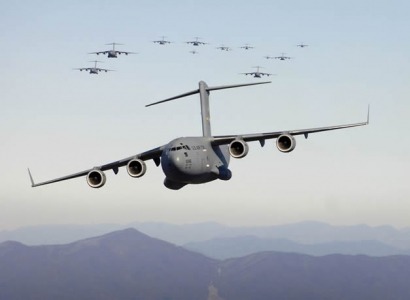
"This certification marks the Air Force's first platform to be fully certified using an HRJ blend," said Dr. Kevin Geiss, the deputy assistant secretary of the Air Force for energy. "This marks a significant achievement for the Air Force, our alternative fuel certification office and our partners in both industry and across the Department of Defense."
The certification for usage of HRJ biofuel blended with petroleum-based JP-8 fuel represents part of ongoing efforts by Air Force officials to certify and test biofuels from non-petroleum sources.
The move to certify the fleet using the HRJ blend of fuel represents the Air Force's commitment to assuring the supply, no matter the source, meets the service's required standards, and demonstrates the Air Force's commitment to reducing its dependency on foreign sources of oil, Dr. Geiss added.
"We're very proud of this certification," said Terry Yonkers, the assistant secretary of the Air Force for installations, environment and logistics. "By using a 'pathfinder' approach, we've taken the success of our processes developed in our previous alternative fuel certifications work and learned how to efficiently streamline our HRJ certification efforts, while guaranteeing the fuel blend will work without notable difference to the pilots."
Mr. Yonkers added that unlike conventional jet fuel, biofuels burn cleaner without compounds like sulfur.
According to Jeff Braun, the Air Force's alternative fuel certification office chief, the blended fuel evaluation that combined additional analyses from Boeing, Parker ESD and Pratt & Whitney resulted in no significant differences in engine stability, thrust response or engine steady-state performance.
This certification clears the C-17 to fly on a volumetric blend of up to 50 percent HRJ fuel with 50 percent JP-8, as well as a blend of 25 percent HRJ, 25 percent synthetic paraffinic kerosene fuel, and 50 percent JP-8, Mr. Braun said.
Normal ops using biofuel
"We expect to conclude HRJ flight testing within the next 12 months, supporting fleetwide HRJ certification within the next 22 months," Mr. Braun said. In addition, the ground and flight demonstrations performed by the Air Force flight test centre confirmed normal operations using the blended fuel, he said. "When blended as we've done, this is a potential drop-in solution for jet fuel for our aircraft, requiring no modification to systems or special handling or monitoring."
"The Air Force is seeking alternative fuels that are 'greener' than the existing petroleum fuels paradigm, but don't add to, or complicate, any logistical considerations for our jet fuel needs, and have the potential to be cost-competitive," Mr. Yonkers said. "And HRJ blended fuels have us very excited."
Mr. Yonkers added that Air Force officials will bring the achievement to their partners within the DOD and industry, and will work to further integrate efforts on testing alternative fuels and the certification of platforms.
For additional information:

